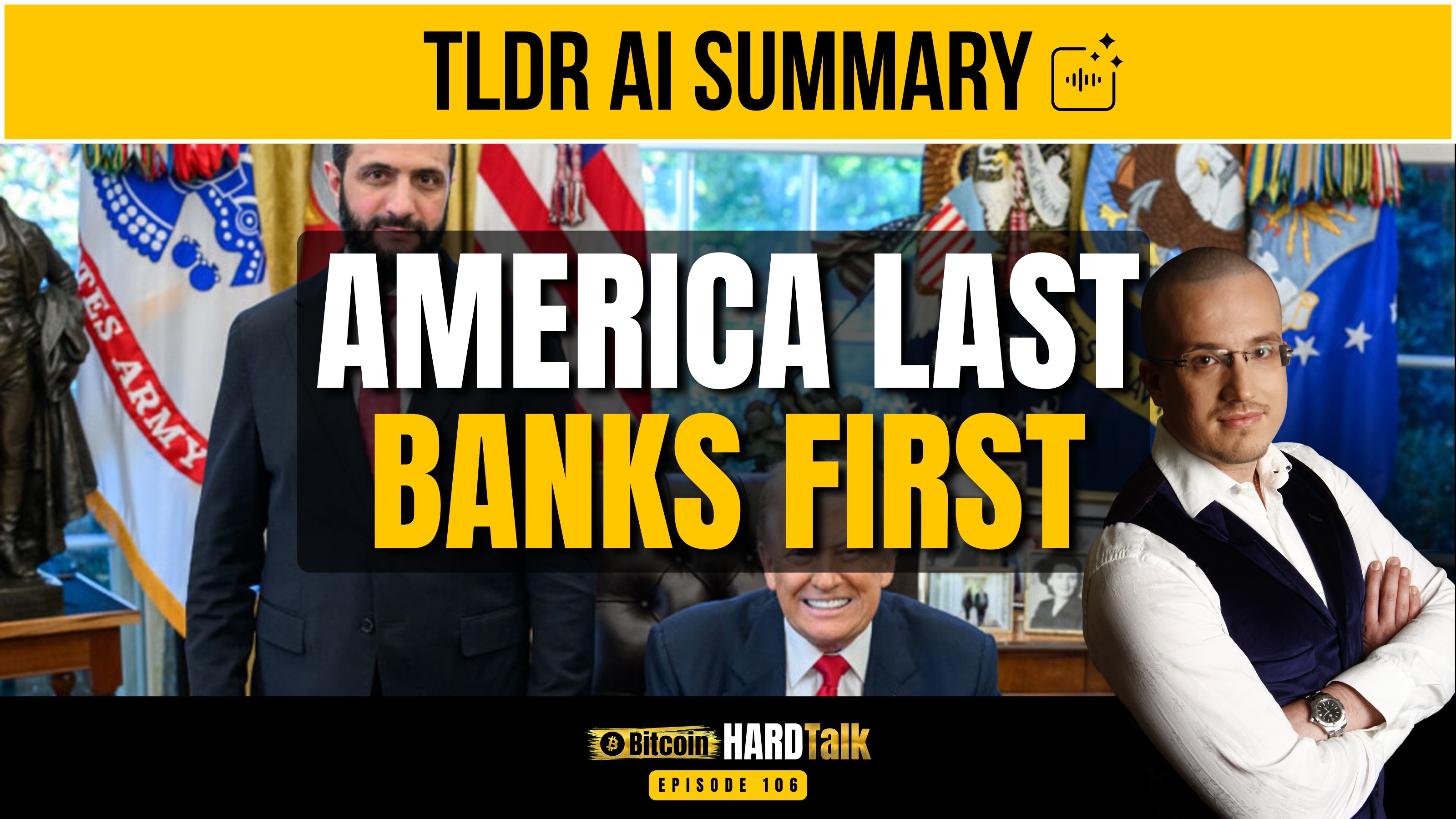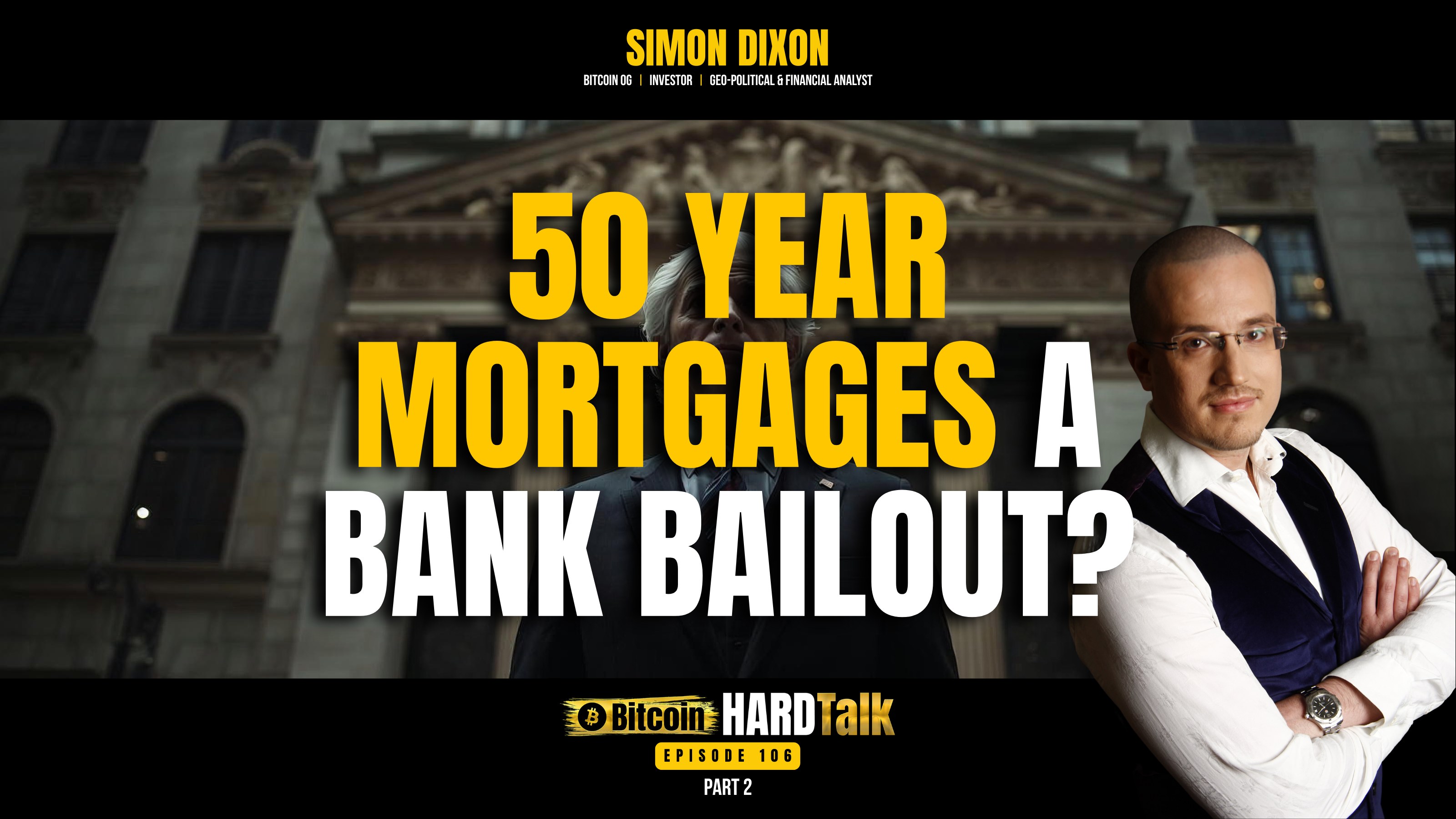🇨🇳 🇺🇸 China vs U.S.: Who Owns the 127,000 Bitcoin? | This Week In Bitcoin | #BitcoinHardTalk Ep.106 (Part 1)
Nov 14, 2025Hey hey Bitcoin Wealth Builders,
When the market corrects, the mainstream media floods the airwaves with panic, fear, and clickbait designed to shake you out of your position. But for a Bitcoin Wealth Builder, a price drop isn't a crisis—it's an opportunity. While others are freaking out, we remain calm, focused on the long-term mission.
Our core philosophy is simple and has remained unchanged for over a decade: own more Bitcoin this month than the previous month, ignore the price, and value your wealth in Bitcoin.
This post is a summary (TLDR) of the first part of Bitcoin Hard Talk Episode 106, "This Week in Bitcoin." We're going to cut through the noise of the recent market "crash" to unpack the hidden power plays happening behind the headlines, from Washington to Beijing to Brussels.
1. Don't Panic, Accumulate: The Bitcoin "Crash" is a Gift
While the financial media uses price drops to engineer fear and herd you into Wall Street's financial products, long-term investors should see these moments for what they are: a gift.
The strategy is to consistently accumulate more Bitcoin each month, regardless of the price. When you shift your mindset to value your wealth in Bitcoin, a drop in the dollar price means your fiat currency suddenly has more purchasing power. The further the price goes down, the more Bitcoin you can acquire.
This isn't theoretical. I've been through this cycle repeatedly:
- I watched my $30 Bitcoin crash to $3.
- I watched my $20,000 Bitcoin crash to $3,000.
- I watched my $70,000 Bitcoin crash to $17,000.
- And now I've seen my $125,000 Bitcoin correct to $96,000.
Each time, the strategy was the same: stay calm and accumulate. The current correction is no different.
I offer you a simple "four-year challenge": adopt this accumulation strategy for the next four years. Consistently stack, secure your Bitcoin in self-custody, and ignore the short-term price noise. I have never met anyone who committed to this and didn't thank me for it later.
2. Built on Seizures, Not Purchases: The Truth Behind the U.S. Bitcoin "Strategic Reserve"
A geopolitical conflict is brewing over a massive trove of Bitcoin. China has officially accused the U.S. of seizing 127,000 Bitcoin, currently valued at around $13 billion.
The Bitcoin in question originated from a global scam operation based in Southeast Asia that defrauded victims worldwide, including many Chinese citizens.
The dispute is a clear clash of narratives:
- China's Position: Beijing calls the seizure a "state-level hack" and outright "theft." They demand the Bitcoin be returned to the victims of the original scam.
- The U.S. Position: The Department of Justice claims it seized the funds under "criminal proceeds laws." It has signaled its intent to keep the Bitcoin, arguing that forfeiture is standard law enforcement practice.
This incident reveals a much larger truth. We are now told that the U.S. Bitcoin strategic reserve is approximately 325,000 BTC. This entire stockpile has been built through seizures—from the 127,000 BTC in this case, to assets from Silk Road, to the Bitcoin taken after the Bitfinex hack—not through open-market purchases. They aren't buying Bitcoin; they are taking it.
This isn't just an observation for me; it's personal. I helped organize a recovery plan for victims of the Bitfinex hack who lost 120,000 Bitcoin. Those assets should belong to the shareholders—and, full disclosure, I am one of those shareholders. But who has them now? The U.S. Department of Justice. They haven't been returned. This exposes a fundamental hypocrisy in how nation-states operate.
"Every accusation is a confession. When they say China's building a social credit score, they mean we're building a social credit score... when they're saying China is a surveillance state, they mean we're building a covert surveillance state."
3. "The China Model for Private Profits": Europe's New War on Your Financial Freedom
By 2027, the European Union is set to implement the biggest overhaul of its monetary system since the introduction of the Euro. The official justification is to combat money laundering. The unofficial consequence is the construction of a mass financial surveillance and control grid.
This new system rests on three pillars of control:
- The Cash Ban: Cash payments exceeding €10,000 will be made illegal, forcing all significant transactions onto a digital ledger that can be monitored.
- The Crypto Identity Mandate: Regulations like MiCA (Markets in Crypto-Assets) are designed to eliminate discourage wallets. They will force all users through stringent Know-Your-Customer (KYC) protocols on exchanges, effectively pushing people away from self-custody and toward centralized, bank-controlled products like BlackRock's ETF.
- The Digital Euro: This is the endgame—a programmable Central Bank Digital Currency (CBDC). The European Central Bank will be able to create fully traceable money, giving it unprecedented control over how, when, and where citizens can spend.
This entire framework is designed to turn Europe into a surveillance state, but with a twist. Unlike in China, where the system is explicitly state-run, this is the "China model for private profits." The architects of the Proof-of-Weapons Network know that a K-shaped economy breeds civil unrest. Their solution is to take the financial weapons they beta-tested in war zones and embed them in a CBDC, creating a system where wealth and control are funneled upward to the private banks and asset managers that dominate the U.S. financial system.
4. Wall Street's Crypto Embrace is a Centralization Trap
Wall Street's recent "crypto-friendly" posture is not an endorsement of decentralization; it's a calculated strategy to co-opt and centralize the industry. They are using a two-pronged approach to capture the market.
- Private Blockchains: Banks like JP Morgan are testing private, permissioned stablecoins. By leveraging their banking licenses, they can create closed-loop systems that give them total control, effectively creating a privatized CBDC.
- Public Chain Dominance: Simultaneously, asset managers like BlackRock are moving to dominate public blockchains. They are investing heavily in tokenization companies like Securitize and launching ETFs for proof-of-stake assets like Ethereum. By controlling the stake through these ETFs, they can attempt to control the governance of the entire network except Bitcoin in self custody.
Regulation is being weaponized to accelerate this centralization. The proposed Clarity Act, which would give regulatory oversight to the CFTC, is a perfect example. On the surface, it appears to democratize access by removing the "accredited investor" rules that the SEC enforces. In reality, this change is a Trojan horse. Unlike the SEC, the CFTC has no "seasoning rules" that prevent tokens from trading from day one. This will open the floodgates for Silicon Valley VCs to launch a new wave of pump-and-dump crypto scams on retail investors, extracting their Bitcoin and consolidating it within the Wall Street system.
The ultimate goal is clear: herd investors out of the freedom of self-custody and into centralized, controllable, and confiscatable financial products.
Conclusion: Peaceful Resistance in a World of Financial Warfare
The financial world is becoming a battlefield. On one side is the "Proof-of-Weapons Network," an alliance of governments, banks, and corporations seeking to impose total, centralized control through surveillance and debt. On the other side is the "peaceful proof of work" of Bitcoin, which offers a path to individual sovereignty and financial freedom.
The strategy to navigate this conflict remains incredibly simple and powerful: Own Bitcoin in self-custody. Simplify your life. Own more Bitcoin this month than the previous month.
This is not just an investment strategy; it's a peaceful resistance. In a world where governments seize assets and build surveillance states, is holding your own keys the ultimate act of financial independence?
Simon Dixon🚀
Bitcoin OG | Investor | Geo-Political & Financial Analyst
Part 5 - Protect Your Bitcoin Before It’s Too Late — Self-Custody Guide with Simon Dixon & Andreas Antonopoulos | Protecting yourself in a world of crypto, AI & CBDC’s
Watch The Full Episode
For the complete context and a deeper dive into these topics, watch the full 52-minute discussion.
Watch #BitcoinHardTalk Ep.106 (Part 1) Here
The full episode also includes Part 2 (This Week in Macro) and Part 3 (This Week in Geopolitics). Don't forget to check out our TLDR and Whiteboard Explainer videos for this episode.
Watch TLDR Ai Summary
Watch the Video (Duration: 24 minutes)
Whiteboard Explainer Video
Watch the Video (Duration: 5 minutes)
🇺🇸 🇸🇾 What Links 50-Year Mortgages to Al Qaeda in the White House? | #BitcoinHardTalk Ep.106
Watch the Video (Duration: 3 hours 43 minutes)
TLDR Ai Summary
Watch the Video (Duration: 24 minutes)

Whiteboard Explainer Video
Watch the video (Duration: 5 minutes)

Related Blog Posts
Are 50 Year Mortgages a Bank Bailout? Are We in an AI Bubble? | This Week In Macro | #BitcoinHardTalk Ep.106 (Part 2)
From 9/11 To The White House | This Week In GeoPolitics | #BitcoinHardTalk Ep.106 (Part 3)
🇺🇸🇸🇾 What Links 50-Year Mortgages, an AI Bubble & Al-Qaeda in the White House? | This Week in Bitcoin, Macro & GeoPolitics | #BitcoinHardTalk Ep.106
Disclaimer
This content is for informational purposes only and reflects personal opinions. It should not be considered investment or financial advice. All investment strategies and investments involve risk of loss. Please conduct your own research and consult a financial professional before making any investment decisions.









